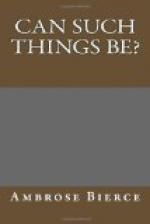In the early morning a curious crowd had gathered about “Deemer’s.” It was composed partly of those who had run away the night before, but now had the courage of sunshine, partly of honest folk going to their daily toil. The door of the store stood open; the place was vacant, but on the walls, the floor, the furniture, were shreds of clothing and tangles of hair. Hillbrook militant had managed somehow to pull itself out and had gone home to medicine its hurts and swear that it had been all night in bed. On the dusty desk, behind the counter, was the sales-book. The entries in it, in Deemer’s handwriting, had ceased on the 16th day of July, the last of his life. There was no record of a later sale to Alvan Creede.
That is the entire story—except that men’s passions having subsided and reason having resumed its immemorial sway, it was confessed in Hillbrook that, considering the harmless and honorable character of his first commercial transaction under the new conditions, Silas Deemer, deceased, might properly have been suffered to resume business at the old stand without mobbing. In that judgment the local historian from whose unpublished work these facts are compiled had the thoughtfulness to signify his concurrence.
STALEY FLEMING’S HALLUCINATION
Of two men who were talking one was a physician.
“I sent for you, Doctor,” said the other, “but I don’t think you can do me any good. May be you can recommend a specialist in psychopathy. I fancy I’m a bit loony.”
“You look all right,” the physician said.
“You shall judge—I have hallucinations. I wake every night and see in my room, intently watching me, a big black Newfoundland dog with a white forefoot.”
“You say you wake; are you sure about that? ‘Hallucinations’ are sometimes only dreams.”
“Oh, I wake, all right. Sometimes I lie still a long time, looking at the dog as earnestly as the dog looks at me—I always leave the light going. When I can’t endure it any longer I sit up in bed—and nothing is there!”
“’M, ’m—what is the beast’s expression?”
“It seems to me sinister. Of course I know that, except in art, an animal’s face in repose has always the same expression. But this is not a real animal. Newfoundland dogs are pretty mild looking, you know; what’s the matter with this one?”




